Michigan may not match other states for its sheer number of ultra-luxury homes, but the appreciation for and value of mega-mansions is finally on par with the wealthiest markets in the country.
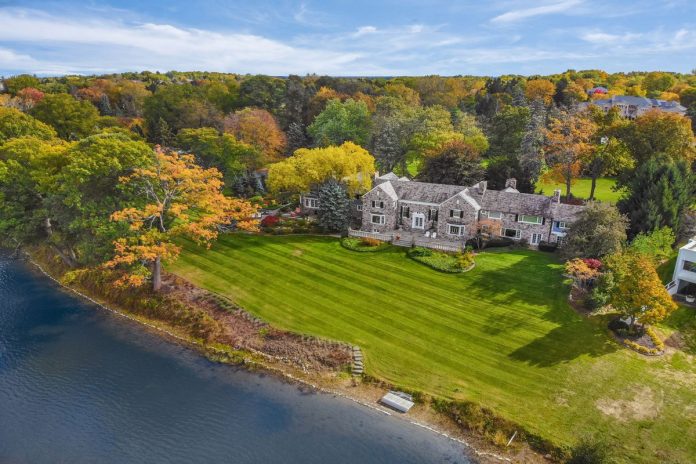
The ongoing battle between players in Detroit’s behemoth mortgage industry may have come down to this: who’s living in the pricier homes?
Recent purchases of multimillion-dollar properties by Mat Ishbia, president and CEO of United Wholesale Mortgage in Pontiac, and Matt Cullen, long a top lieutenant of Rocket Mortgage, part of Rocket Cos. in Detroit, could be considered the latest salvos in one of the biggest wars in Michigan business.
In January, Cullen, whose official role now is chair of Jack Entertainment, a Cleveland-based gaming company formerly owned by Dan Gilbert, founder and chairman of Rocket Cos., laid down more than $4.6 million to purchase a lakefront spread in Grosse Pointe Shores that was owned by the family of the late billionaire philanthropist Ralph C. Wilson Jr.
The estate, located adjacent to the Grosse Pointe Yacht Club, consists of three structures — a Mid-century Modern house of nearly 5,500 square feet, a guest cottage, and a farmhouse — all of which abuts 450 feet of shoreline along Lake St. Clair.
Cullen’s move came only months after Ishbia hatched plans to build the state’s largest occupied house, a planned 60,000-square-foot colossus in Bloomfield Township that will require him to raze five houses — including his own existing, 22,000-square-foot home.
He can readily afford the upgrade, as Forbes magazine ranks Ishbia as Michigan’s fourth-wealthiest person, with an estimated worth of $4.5 billion as of 2022.
Ishbia plans to assemble 14 acres for a mansion, a trampoline park, a basketball court (standard equipment for the new owner of the Phoenix Suns), an additional “sports court,” a treehouse, a reflecting pool, a 14-foot-tall waterfall, a “lazy river” spanning some 200 feet, and even something called an “Enchanted Forest,” according to documents Ishbia submitted to township officials.
Indeed, Ishbia’s new spread will be “its own animal,” says Katherine Rodriguez, head of her own bespoke studio in Birmingham, where she and her team design the interiors of many of the area’s ultra-luxury homes.
Overall, signs of residential activity are percolating in the tippy-top of the state’s housing market these days. In last year’s third quarter, Detroit ranked No. 9 in the luxury breakout of The Wall Street Journal/Realtor.com Emerging Housing Markets Index, which looks at the top 10 percent of housing in major U.S. metropolises.
The Detroit area’s median luxury listing price rose 6.4 percent year over year, as a limited high-end inventory of homes accelerated in value here compared with much of the rest of the country, and pushed purchase or construction costs for the priciest homes to $1,000 a square foot and more.
Fortunately for the local economy, that performance isn’t mere froth, but is well supported by strong appreciation in the general housing market underneath. At 6.7 percent over a year earlier, Detroit-area home prices in September showed a percentage increase higher than any of the other 20 metro regions in the S&P CoreLogic Case-Shiller index.
Nationwide, prices were up 3.9 percent from September 2022.
“Five years ago, where we were going with real estate, you never would have imagined what you see right now,” says Arya Afrakhteh, founder of Brandywine Homes, a Birmingham-based luxury builder that focuses on the region’s northwestern suburbs.
“You go to California and look at the top-end homes that sell there, or flats and other properties in New York City, and it used to be much easier to sell at that high end than in our market. But that has changed tremendously. We’re on par with those markets now.”
Dan Gutfreund, an agent focused on the ultra-luxury market for Signature Sotheby’s International Realty in Birmingham, notes “the values of new-home construction have been considerably lower in Detroit than in other major cities in the U.S. for a long time. Now, we’re even bumping up against major international cities like Toronto, where you can’t find luxury homes for under $1,600 to $1,700 a square foot.”
Just look around the area and the state, and more and more valuable jewels emerge. Consider, for instance, the $4.8-million price being sought for a nearly century-old, French Norman-style chateau mansion in Grosse Pointe Farms that went on the market last year. It features a walnut library and a central Belgian block-granite courtyard with a fountain and a turret.
Or the 22-acre estate in northern Rochester Hills with a 10,000-square-foot main house called “La Reve” — “the dream” in French — which, among its 118 rooms, includes an entertainment parlor featuring a billiards area, a library with gold accents, a heated court, a conservatory, a gazebo, a bowling lawn, and a formal English boxwood garden. It didn’t sell at auction in October and is still available.
Shifting west across the state to Holland, nearly 15 years ago Dick and Betsy DeVos demolished his father’s former 12,000-square-foot estate on Lake Macatawa to make room for a new, 22,000-square-foot, Shingle-style mansion that cost some $3 million to build and certainly would list for at least twice that amount if the Amway heirs sold it today.
Zigzagging to northeastern Michigan, a 3,500-square-foot lodge on Misery Bay Road in Alpena is decidedly unprepossessing, with five bedrooms and three bathrooms mostly clad in knotty pine. But the reason this property is valued at $18 million, among the highest in the state, is its 18,480 feet of pristine Lake Huron shoreline, along with 710 acres of undeveloped property. It comes complete with a pole barn with tractors, excavators, and other outdoor play equipment.
Proceed due west from the lodge to Charlevoix, where for $4.5 million one could buy a sui generis dwelling built by an architect for $2.8 million in the style of The Hobbit, complete with roofs that look like mushroom caps, oversized heavy wood beams, white-painted walls, a stone wet bar, a wine cellar, and a media room.
At the very pinnacle of the multimillion-dollar homes where enormously wealthy individuals play, Michigan still doesn’t qualify with the longtime elite markets such as metro New York City, southeastern Florida, Hollywood, or Silicon Valley. Indeed, the number of houses that sell for more than $5 million amounts to only a handful each year in Michigan, versus dozens in some of the major coastal markets, and even metro Chicago.
In 2023, there were three sales of luxury homes priced at more than $5 million within a 20-mile radius of Detroit. In early January there were nine estates on the market in southeastern Michigan for more than $5 million, per Zillow.
“So there’s basically three years’ worth of inventory sitting on the (Michigan) market,” says Scott Kirk, head of Interluxe Auctions, a Charlotte-based online auctioneer that transacts homes at prices from $2 million to more than $10 million.
Indeed, Detroit’s upper level of homes remains a relatively small sample size, but there’s no doubt that, since the end of the Great Recession of 2008 and 2009, and with an accelerant provide by COVID-19 and its aftermath, the value and activity in such houses in Michigan have been rising like few other places in the country.
The ascent of southeastern Michigan in the ultra-luxury segment relies on several factors. Most important is the continued prosperity of the auto industry. Michigan’s carmakers and suppliers have encountered all sorts of ups and downs over the last two decades — including the ongoing bumpy transition to electric vehicles — but the long-term outlook for the state’s global leadership in its most significant native industry remains bullish.
Meanwhile, thanks to the last decade or so of a vibrant economy overall, many company owners in southeastern Michigan have sold their businesses “and wanted to live at a certain level, so they’re investing in that,” Gutfreund says. “Or they have family members who are coming back from going to (college) out of state and want to enjoy the quality of life here, which is better than elsewhere.”
Kathy Broock, principal of Kathy Broock & Co. Max Broock Realtors in Birmingham, says the boom in the area’s ultra-luxury market “is a phenomenon that has especially taken hold since the recession, because a lot of people invested in commercial buildings and other properties during the recession, and now they’re worth hundreds of millions of dollars.”
The pandemic also shifted things in Michigan’s favor, as wealthy individuals who could afford to escape their domiciles on the coasts came to the state looking for more wide-open spaces.
Foreign buyers, many tied to the worldwide auto industry, also have helped boost local demand: 52 percent of luxury-home shoppers in the Detroit area last year were from other major cities, according to Realtor.com. Almost 29 percent of these out-of-state buyers were from the New York City area, and almost 9 percent came from Washington, D.C. “You have money coming in from other states where the cost of living is greater, and that money is driving up values in Michigan,” Gutfreund says.
Other factors may be coming into play, as well.
There’s an increasing rationale behind the idea that, over the long term, southeastern Michigan and the entire state will benefit from rising concern about weather events and climate. As places like California, the Southwest, and the Mountain States deal with water shortages, and as much of the South copes with more torrid summers, living in a multimillion-dollar home on one of Michigan’s pleasant peninsulas, with mild weather most of the year, looks increasingly inviting to people with ultra-means.
“There are drought issues and fire issues in California, on top of the political issues, for example,” Gutfreund says. “People are moving toward the Great Lakes because of climate.”
On the other side of the equation from burgeoning demand is how a constricted supply of available properties has helped raise the peak in values of ultra-luxury housing in Michigan.
A unique brew of factors, including higher interest rates and demographic inevitabilities, have created a situation where many owners of homes in the $2 million to $3 million range simply don’t want to move up to pricier houses because their mortgage rates will be higher — and their property taxes will be much higher. At the same time, they won’t get that much more “house” for the money.
“With interest rates down around 2 or 3 percent, people refinanced their homes,” Afrakhteh says. “Now, with rates at 7 to 8 percent, they’re not ready to sell their home because of what they’d have to pay for financing a more expensive home. You only see people willing to sell their luxury homes if there’s a divorce or a death.”
The demographics are based on what is happening — and what isn’t happening — with transfers of homes and wealth from baby boomers, who were America’s largest and richest generation, to their offspring, millennials.
Consider what’s not happening. Many boomers in multimillion-dollar homes who want to extend the comforts of a luxury domicile into the last period of their lives have decided to stay put rather than sell their spacious house and pay even more for another top-level home — which may be pricier even if they would be physically downsizing.
In addition, baby boomers have begun dying off in significant numbers, which gives their offspring access to the ultra-luxury homes their parents have owned. “We’ve never seen this kind of transfer of generational wealth,” Broock says.
Boomer parents at every economic level by now are used to realizing that their millennial offspring generally don’t want their parents’ stuff. Amplify that in the luxury-home market. The more millennials are counted among the buyers of ultra-luxury homes, the more they want to build their own home rather than purchase, and perhaps overhaul, an existing mansion.
“They want the new construction, which is interesting,” Broock says. “It wasn’t long ago that millennials didn’t even want a home and just wanted to rent; now they want a house.”
In any event, this mix of factors means there’s somewhat of a logjam among homeowners in Michigan who want to move from the level of $2 million to $2.5 million homes to, say, $4 million to $9 million.
“There are plenty of houses to look at in that level, but they’re still sitting there unless they’re super-amazing homes or unless a few people with deep pockets are coming in,” says Debbie Nelson, a luxury home specialist at DOBI Real Estate in Birmingham. “I’ve got one $7-million buyer who can look at homes that have been listed for $10 million or $11 million where the sellers are begging for buyers. The only people operating at that level are professional athletes or people who have owned their homes forever.”
All this is at play in the Birmingham-Bloomfield Hills hotbed of luxury-home sales. “You see the most density in that area, but you also have a lot of lakes,” says Broock, who began in the real-estate business answering phones as a teenager at her great-grandfather’s company, which was founded in Detroit in 1895. Now, as the fourth-generation owner, she conducts the largest share of luxury-home sales in metro Detroit.
“Grosse Pointe has one waterfront, but we have multiple lakes where you have a broader bandwidth of opportunity. That’s where you’re seeing $7 million to $10 million purchases,” Broock says.
Afrakhteh has been a player in that area since the former nuclear-project engineer moved to Michigan in 2005 and began a bespoke-home construction business with a single $1-million house he built on spec along East Frank Street in downtown Birmingham.
Ironically, executives who were coming in to help restructure the Detroit Three during the post-bankruptcy era were his first customers, and the housing crash that brought about the Great Recession opened up opportunities for the entrepreneur, who started with no overhead.
“I was able to get A-list subcontractors who were all eager to do the work, and develop relationships with them,” Afrakhteh says. “I took care of them; they took care of me. They helped me to bring Brandywine to the level it is now.”
Brandywine includes the sale, last fall, of a $6.9-million mansion adjacent to the Bloomfield Hills Country Club along West Long Lake Road in Bloomfield Hills. The home, measuring nearly 9,400 square feet, is situated on more than an acre and includes six bedrooms and 7.5 bathrooms; a kitchen-adjacent scullery with a double wall oven, a built-in Miele coffee maker, and a double-drawer refrigerator; a four-car heated garage; and a pricey gunite swimming pool with an attached spa.
“Everything is turnkey and very detailed, and I gave a lot of personal attention to it,” Afrakhteh says of the house, which came at an unusually high price point for a home built without a designated buyer. “I like to do spec homes because I’m free to use my innovation and thinking and creativity. I can let my imagination go wild.”
Yet, as with all builders in these long-standing communities of northwestern Oakland County, usually Afrakhteh must start his projects with tear-downs of existing homes. And given the economic factors that have hindered movement in housing up and down the value scale lately, he has to search harder than ever for available properties.
“I used to have four to five tear-downs in my inventory, in top locations, but now those are a lot harder to come by,” Afrakhteh says. “They’re extremely rare in this area now, and that wasn’t the case before. If one tear-down comes to market, 200 people try to jump on it.”
Some of those tear-downs were on Old Woodward Avenue in Birmingham, and made room for Brookside Residences, a boutique condo development with 28 units that sold for $5 million to $6 million apiece.
“Although it doesn’t have a hotel component, the development has been compared to Ritz-Carlton living because of all the amenities,” Gutfreund says. The features include in-home medical care, wake-up calls, car and concierge services, private chefs, housekeeping, and dry-cleaning.
In some ways, it’s “up north,” not the Detroit suburbs, that has served as the bell cow in the ultra-luxury market in the state, with southeast Michigan homes only recently catching up to the value of many of the priciest properties in places like Harbor Springs or along the shores of Lake Michigan.
For example, in 2022 a buyer purchased a home in Charlevoix for $9.8 million, which came to more than $10 million after the owner threw in much of the furniture. Interluxe entertained more than 1,500 buyer inquiries that came from more than 30 different states and countries. Ultimately, there were 12 bidders.
Typically, Kirk says, his properties receive 800 to 1,200 buyer inquiries. The purchase price of the Charlevoix mansion was the third-highest ever paid in Michigan for a residential property.
“People have been buying in those areas for $10 million or at least $7 million for a while,” Broock says. “A big reason is that people are coming from all over the country to purchase vacation homes there, from more sources of wealth, flying in from (the East Coast) or Texas on their private planes” to Pellston Regional Airport or Harbor Springs Airport in Emmet County, or to Cherry Capital Airport in Traverse City, which can accommodate Delta Airlines jets on direct flights from Boston, Dallas, and New York City.
In southeast Michigan, “we’re only now getting competitive with that” level of purchase prices, Broock says. “Our community has been very slow in embracing the fact that we’re a luxury market.”
There are reasons the Detroit area has trailed some of the highest-end transactions up north. Sticker shock — a familiar concept to automotive executives — is one reason.
For decades, local denizens have taken a sort of collective pride in the wealth present in Oakland County, and its national ranking of per capita income, which points to the importance of the auto industry and the magnitude of its role in the global economy and in the pursuit of individual wealth. But the current narrative surrounding super-high prices for incredibly large homes is a relatively new one to this area.
Michigan also differs from many of the leading ultra-luxury markets for other reasons. There is, for instance, a relative absence of investors purchasing top-notch houses for investment purposes alone.
“Our market doesn’t really deal with private equity the way markets like Miami and New York City do,” Broock says. “In those markets, you’ve got (investors) willing to buy a place for $7 million because they can flip it for $14 million. In Michigan, our community is more about single-family homes, even at the very highest end, where you’re buying it to come in and live in it.”
For example, despite Ishbia’s recent over-the-top plans for his mega-mansion in Bloomfield Township, Gutfreund remarks that the local kingpins of the mortgage business, such as Gilbert, have “lived very conservatively” relative to other titans of business across the country.
At the same time, Kirk notes, many owners of ultra-luxury homes in Michigan also own even higher-priced residences elsewhere, including Florida, Arizona, or greater Denver. “The number of homes in Michigan that are in this category isn’t nearly as plentiful as in many other locations around the country,” the auctioneer says.
Michigan native Rodriguez got her start decorating ultra-luxury homes in the Birmingham-Bloomfield Hills area after she and her husband moved back to metro Detroit from Chicago in 2011. As it worked out, she was able to tap into her understanding of the unique sensitivities of Midwesterners — even at rarefied financial levels.
“There’s something about our market in particular, and the Midwest in general, where people are concerned with durability and wear and making sure their home is functional for them,” Rodriguez says. “That’s part of luxury, too — that their life is easier because we’ve designed their home well. That takes pressure off of executives and people at that level.”
In general, she says, “They’re generally very detail-oriented people, which is how many got to be successful. They want to be aware of what’s going on. They may say yes to a lot of things I bring them, but then they want to know the details of the inserts in their kitchen-cabinet drawers, and that their fabrics will be performance fabrics because they have dogs. Or they may pick the exact cushion they will sit on for their couch, in person, versus buying something quickly online and being disappointed.”
As relatively conservative as it remains, Michigan’s top-crust housing market isn’t immune to economic ripples.
The Great Recession stopped the segment — and nearly all other housing construction in Michigan — in its tracks. And while the pandemic of 2020 to 2021 was an accelerant, the top-end housing market in Michigan hit another speed bump in late 2023, in the form of the six-week strike by the United Auto Workers against the Detroit Three automakers.
Many executives at the car companies and their suppliers hit the pause button on selling and buying, Kirk reports, although activity was back to normal levels soon after the settlement of the walkout in late October.
Nationally, Kirk says, “there’s been a significant slowdown in the last year in the speed with which (ultra-luxury) properties trade.” As for 2024, players believe that an expected leveling of interest rates in the new year, perhaps followed by a drop of 100 or 200 basis points, will loosen up the logjam that has put ultra-luxury home sales in a slog, just as it has affected sales in the general market.
“The supply will remain low well into the next few years,” Afrakhteh predicts. “But as the rates fall, it will bring people in who have been holding off purchases. This will continue the strong value dynamics in this (ultra-luxury home) segment in Detroit for years to come.”
Creature Comforts
Today’s ultra-luxury homebuyers and builders in Michigan are looking for some things, and decidedly not wanting others. Among the top preferences are:
The great outdoors: Spending on outdoor entertainment spaces has gone bonkers, including cushy seating areas and fire pits, along with basketball, tennis, and pickleball courts. As for swimming pools — they want outdoor ones, not indoor.
“Years ago, people didn’t want a pool because of the maintenance costs,” says Kathy Broock, principal of Kathy Broock & Co. Max Broock Realtors in Birmingham. “People were joining country clubs. But after COVID-19, they don’t want to go to public pools. They want their own. And (they want them) outdoors; indoors is hard to sell.”
Cue the movie: There’s still demand for dedicated home-theater rooms, but that has waned a bit. “Everybody’s got large-screen TVs in their family room, anyway,” says Arya Afrakhteh, founder of Brandywine Homes, a Birmingham-based luxury builder. “Another part is that people are watching everything on their phones.”
Up from the earth: One amenity that’s nearly exclusively available only to the wealthy is geothermal systems, which heat homes by drilling holes deep into the ground, akin to water wells, but tapping the earth’s heat instead. “It’s very expensive to install,” auctioneer Scott Kirk says, “but it’s very efficient.” In-floor radiant-heat systems also appeal to many buyers.
Man the perimeter: Multimillion-dollar homes now typically include advanced security systems that only begin with front gates and encircling fencing. Today, they deploy all manner of advanced technology through camera systems and other means of detection that feed a remote viewing room in the home.
Nice, not big: “More people in this segment are building new construction on small lots where spaces are smaller,” says Debbie Nelson, a luxury home specialist at DOBI Real Estate in Birmingham. “They want convenience and amenities, not big lots.”
Shuffling space: Formal living rooms “went out a long time ago,” Afrakhteh says, “and now there isn’t formal dining anymore. People are getting more casual about everyday living and want more bells and whistles, versus square footage.”
Even so, Nelson notes, luxury buyers “want a huge master suite and large baths and finished basements.”
Side note: Kitchens have evolved into important entertainment spaces, which means the slicing and dicing of meats, cheeses, and other delicacies is now done in sculleries or butler’s pantries.
“People are using adjacent smaller rooms almost as a dirty kitchen, doing the prep work there behind or off to the side of the kitchen,” designer Katherine Rodriguez says. “Then they can lay everything out on a big, beautiful island in the kitchen, where everyone is gathering.”
Fore: Golf-simulator rooms have become popular for high-ceilinged basements, imitating the experience many golfers are getting at facilities such as Five Iron Golf in downtown Detroit. Installation costs range from about $30,000 to as much as $150,000.
Going up: Rodriguez says occasionally her clients want an elevator. “That would seem to be a little extreme,” she says, “but it goes back to being practical. In multimillion-dollar homes, is there a better way to be practical than that?”
Look out below: Occasionally, buyers and builders want enough room for their own helipad. “One auto-supplier executive from China wanted to put one in a backyard in Bloomfield Hills,” says Dan Gutfreund, an agent focused on the ultra-luxury market for Signature Sotheby’s International Realty in Birmingham. “It never came about because moving that kind of money out of China is difficult.”
— By Dale Buss
Dream Homes
Here are the 10 most expensive homes in Michigan, as listed in the Realtors’ Multiple Listing Service database last year:

1500 W. Long Lake Rd., Bloomfield Township
Listing price: $9,999,000
Square footage above ground: 10,204
Amenities include: Constructed in 1938 (by the firm that built New York’s Cathedral of St. John the Divine) for former General Motors President and U.S. Defense Secretary C.E. Wilson. Three acres, 297 feet on Island Lake. Fully renovated, with seven bathrooms, 9.5 baths, and a nanny suite.

3499 Franklin Rd., Bloomfield Township
Listing price: $9,995,000
Square footage above ground: 12,143
Amenities include: Four-acre site. Seven bedroom suites, Versace floors, chef-grade appliances. Finished walkout basement including 4-D movie theater, sauna and steam room, hot tub, and gym. Full indoor, Detroit Pistons-themed basketball court. “Savant smart” programmable tech.

1558 Dutton Rd., Oakland Township
Listing price: $9,900,000
Square footage above ground: 16,500
Amenities include: Named “La Reve,” or “The Dream.” Twenty-two acre site. Hand-carved wooden archways and hand-painted ceiling. Three levels of living space, 118 rooms and 131 doors, two guest homes with additional garages. Tennis court. Heated conservatory. Lush landscaping.
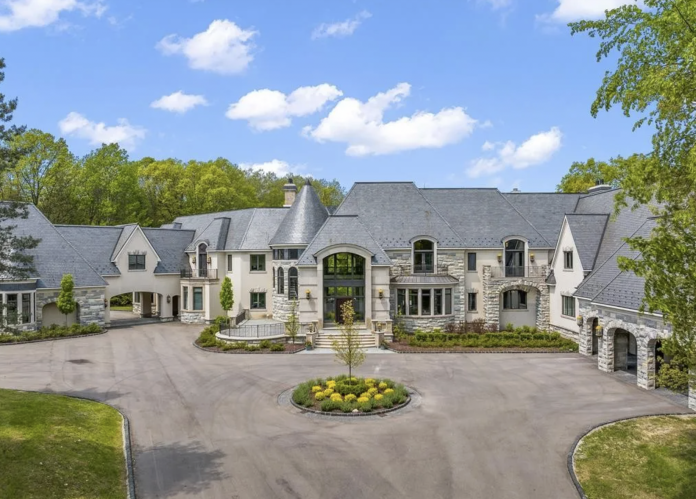
1700 Great Fosters Court, Oakland Township
Listing price: $9,850,000
Square footage above ground: 20,064
Amenities include: Set on 8 acres. Includes 15-car garage with space to house a 90-foot motorhome. Two-story foyer with a grand chandelier and marble flooring, floors of multiple variations of hardwood species, Gunite indoor pool with waterfall and hot tub. “Hidden passageways” and “secret doors” lead to a poker room with a full bar. Three laundry rooms.
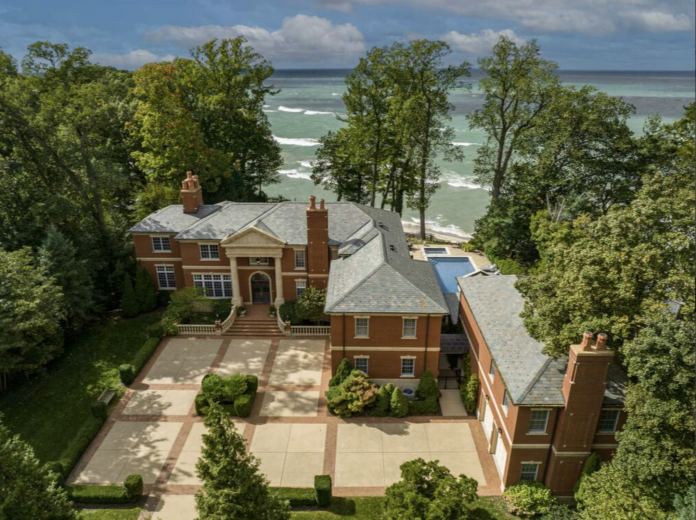
14612 Meadow Lane, Chikaming Township
Listing price: $9,450,000
Square footage above ground: 7,293
Amenities include: Sited on 148 feet of Lake Michigan frontage. A 40-foot swimming pool and spa overlook sandy riparian beach. Nine bedrooms, 13 baths. French doors open to a large stone terrace overlooking lush landscaping and the lake. Radiant-heated floors. Four-bedroom guest house.
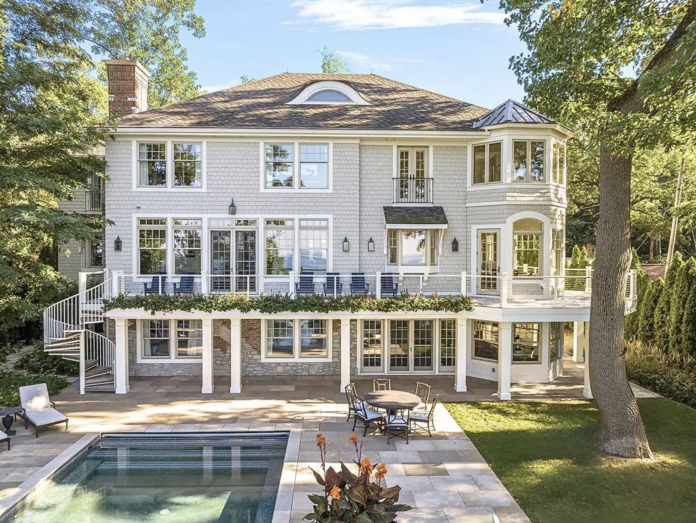
16096 Lake Ave., Chikaming Township
Listing price: $9,200,000
Square footage above ground: 7,250
Amenities include: A hundred feet of private beach on the Chikaming side of Union Pier. The nature-inspired color palette reflects the lake and sky, and the lower-level living room opens up to a spacious pool area. Stunning lake views from nearly every room in the house. Expansive gourmet kitchen.
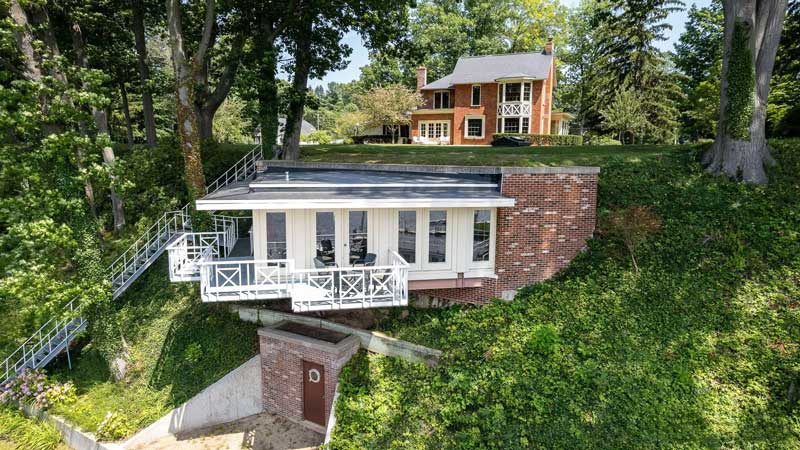
116 Riverside Drive, Saugatuck Township
Listing price: $8,750,000
Square footage above ground: 2,841
Amenities include: Historic property called “Riverside.” Nearly 400 feet of prime water frontage and 2.7 acres, with 180-degree views up and down the river and a protected view of iconic Oxbow property. The property was a vibrant artists’ retreat and was a major influence in Saugatuck becoming known as the “Art Coast.”
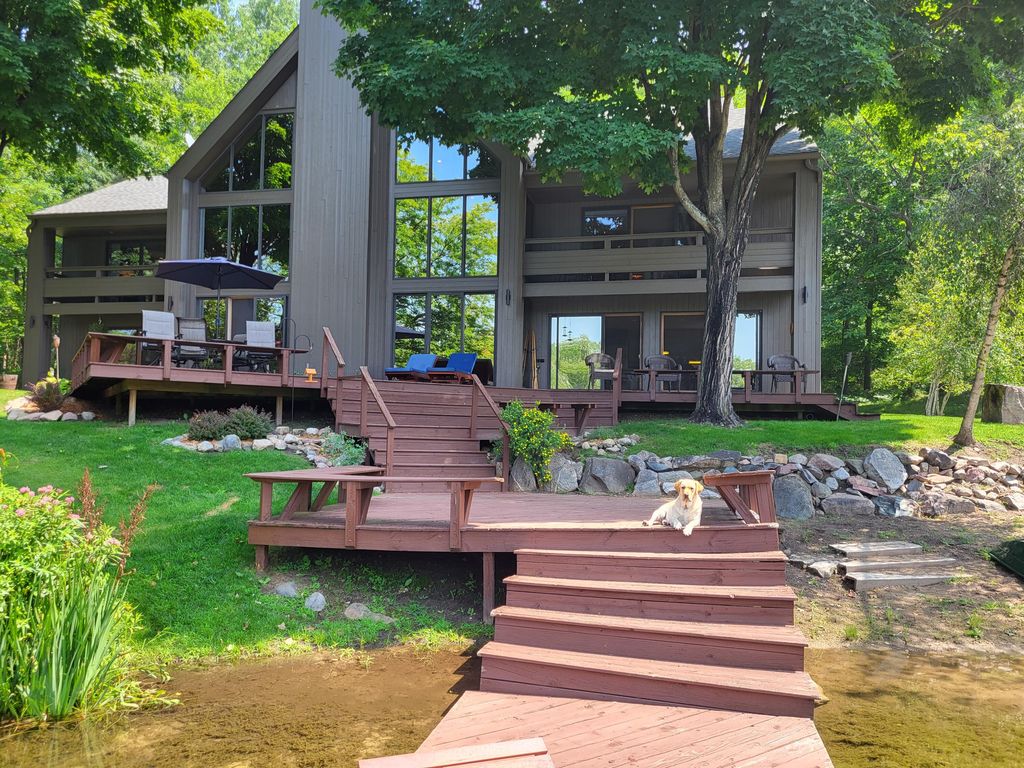
100 W. Adams Rd., Lincoln Township
Listing price: $8,750,000
Square footage above ground: 4,996
Amenities include: The site is called Cherokee Acres Ranch; it’s a 645-acre property featuring hardwood ridges and a spring-fed trout pond. A vibrant creek, marsh pond, swales, and cedar swamps make the land an ultimate wildlife habitat. The lodge and guest house include a three-car garage.
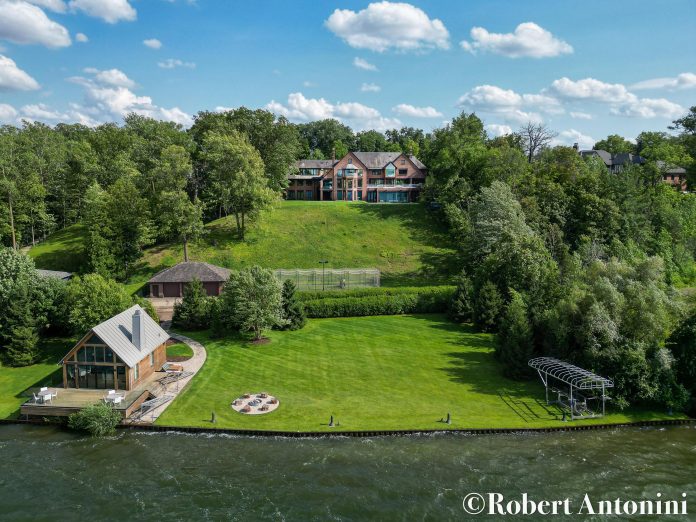
2905 Bonnell Ave. SE, East Grand Rapids
Listing price: $8,600,000
Square footage above ground: 9,160
Amenities include: Gated property on Reeds Lake with water views from every room, as well as a boat house and batting cage. Five bedrooms, seven bathrooms, and four half-baths. Almost 2 acres. Features oversized kitchen islands, a recreation room, wine vault, additional kitchen, home theater, and elevator.

1155 Quarton Rd., Birmingham
Listing price: $7,299,000
Square footage above ground: 11,479
Amenities include: Four acres and two residences; the original 8,200-square-foot home was built in 1838. The second home, built in 2005, features a walkout basement and eight-car garage, half-court basketball court, and indoor pickleball. Lush landscaping leads down to the Rouge River.
Disclaimers: A few cities and locales don’t list properties in the MLS database. Condominiums aren’t included. Doesn’t include sales by private owners directly to clients.

